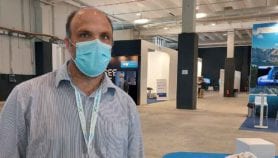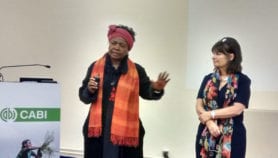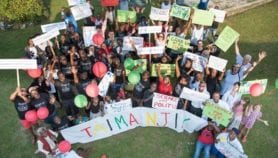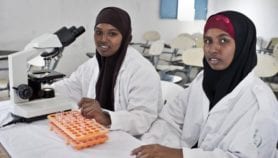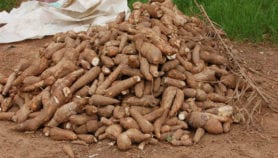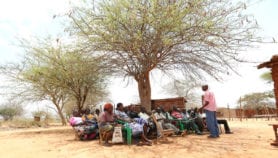By: Luisa Massarani
Send to a friend
The details you provide on this page will not be used to send unsolicited email, and will not be sold to a 3rd party. See privacy policy.
The past 20 years have seen a boom in science communication in Latin America. But there is still a long way before it can be said that information about science is consistently reaching everyone on the continent.
Many channels are currently used to communicate science in Latin America. These range from the most common — namely magazines, newspapers, radio and television — to the more unusual, and even provocative. The latter have included public events in bars and other venues outside the academic circuit, dramas, soap operas, comic books, poetry, games, story-telling, science fairs, and even science-based participation in Peru’s parades and Brazil’s annual Carnival.
Much science communication make use of new technologies, particularly the Internet and multimedia, although the coverage of such new technologies throughout the continent remains limited, particularly in the poorest areas. A prominent role has also been played by interactive science museums and centres; Brazil, for example, has about 100 new science centres throughout the country, most being small in size, and having been set up in the last decade.
Such initiatives are not isolated from one another. 1990 saw the creation of Red-POP, an interactive network that brings together about 70 members throughout the continent, including centres and programmes for the popularisation of science and technology in Latin American and the Caribbean. Its main goal is to strengthen exchange of ideas and active co-operation between its members.
In addition, there has been a significant increase in the number of meetings bringing together individuals from a range of professions to analyse and discuss strategies to enhance communication of science-related issues. Proper training for science communicators has been a constant item on the agenda of such meetings; although a number of courses (including master and PhD courses) have already been created at universities and scientific institutions, many feel that there is scope for more.
At a national level, a number of Latin American countries have created national science communication plans. One successful example is the Explora programme in Chile, created in 1995 by CONICYT (the National Commission for Scientific and Technological Research).
Panama is another country that has programme in the popularisation of science; created in 1997, DESTELLOS is linked to the country’s SENACYT (the National Secretary for Scientific Research). And the implementation of a plan for popularising science in Brazil, which was part of now-President Lula’s campaign platform in 2002, is currently being implemented within his government.
Several local plans also have been created. In Brazil, for example, this has even been done in remote areas such as Amapá, a state in the North of the country. Other countries, even if they lack a national plan, have made significant efforts to promote science communication, such as Mexico.
Given these activities, it is perhaps not surprising that issues around the public communication of science have also been gaining increasing prominence on the political agenda, partly a reflection of social and economic policies that are intended to help countries in the region participate more fully in the global knowledge economy.
In Brazil, for example, government agencies such as the National Research Council (CNPq) and the Funding Agency for Studies and Projects (Finep) — both linked to the Ministry of Science and Technology — as well as state-level bodies that support research, have each recently set aside resources for science communication. And such activities are mentioned explicitly in the science-related legislation of a number of Latin American countries, such as Costa Rica and El Salvador.
Finally the Organisation of American States, through its Office of Science and Technology, is currently planning a Hemispheric Policy for Science and Technology Popularisation (see Science communication climbs Latin American agenda).
This trend reflects a growing perception of the need for better links between science, public, and society. There seems to be an increasing recognition in both political and public circles that if Latin America is to become a prosperous and scientifically-developed society, its population must be well-informed on science-related issues.
Several Latin American governments, however, still need to do better in this area, targeting more funding — and in a more organised way — towards science communication, and supporting more programmes involving different actors, organisations, and instruments, in order to increase the impact of their work.
Furthermore, government initiatives should be better targeted towards the poorer groups in society, which still occupy only a peripheral role in science communication activities. The audience for such activities still tends to be come from the high social classes — and from the richer countries.
The cultural diversity of Latin America also needs to be considered when designing science communication activities and collaboration on the continent. So, too, do local needs. And improved dissemination of science produced in the region also should be a priority for all those engaged in science communication.
In terms of approach, one important issue that needs to be addressed is the fact that a significant proportion of science communication activities in Latin America are based on the so-called ‘ deficit model’ of the public understanding of science. In such a model, science communication is based on the strategy of transferring packets of scientific knowledge from a privileged and literate group to the less well educated sections of the population.
Current approaches to science communication, however, consider the task to be much more complex. It is seen as requiring recognition of the public as an important actor in disseminating information about science, enabling individuals to take a stance that is simultaneously participatory and critical towards the role of knowledge in decision-making processes.
The debate on genetically modified (GM) crops and food is a good example of this issue. It is not sufficient to explain the scientific aspects of the issue (see Por que precisamos de um novo fórum para o debate público sobre biotecnologia). A much wider spectrum of relevant issues should be considered, including the cultural aspects, legal, moral and ethical issues, the risks (whether to human health or to the environment), scientific uncertainties and controversies, and financial aspects.
Another key aspect is the public attitude toward GM crops and food, which can vary between countries. Compare Argentina and Brazil, for example, two countries that, although neighbours, have different relationships towards GM crops. The first is an important producer of such crops. In contrast, Brazilian legislation currently prohibits the growing and sale of transgenic products (although there is at present an exception for soya, see Brazil agrees to cultivation of GM soya).
Initiatives through which issues that concern the impact of science on society can be openly debated are very welcome, particularly where these can include consideration of the situation in particular countries and regions.
SciDev.Net was launched on December 2001 to enhance the provision of reliable and authoritative information on science- and technology-related issues that impact on the economic and social development of developing countries.
Last year, Scidev.Net’s Latin American gateway was expanded to enable it to increase its coverage of debates on science in Latin America. We are now launching electronic guides — known as an e-guides — to science communication in both Spanish and Portuguese. These are intended to support scientists, journalists, policy maker, or indeed anyone interested in science communication, to share their experiences and stimulate the search for more effective strategies for communicating science.
SciDev.Net has also been organising meetings on science communication that have proved to be an excellent opportunity for bringing together science communicators and others interested in the field, as well as strengthening groups working in Latin America. Since 2002, we have organised a total of five meetings in this continent including meetings in Tobago (2002), Brazil (2003); Argentina (2003); Costa Rica (2003); and Panamá (2004).
The complexity of the economic and social challenges facing all countries in the region mean that communicating science and technology issues in a more critical and participatory approach is a significant challenge in Latin America. So, too, is stimulating the creation of networks to joint initiatives. We hope that SciDev.Net can play an important role in this task, and, in doing so, contributing to the collective effort. We invite you to join us in this effort!
More on Networks

Script media release
Journalists offered ‘big break’ mentoring opportunity from Radio Nigeria
03/04/19



